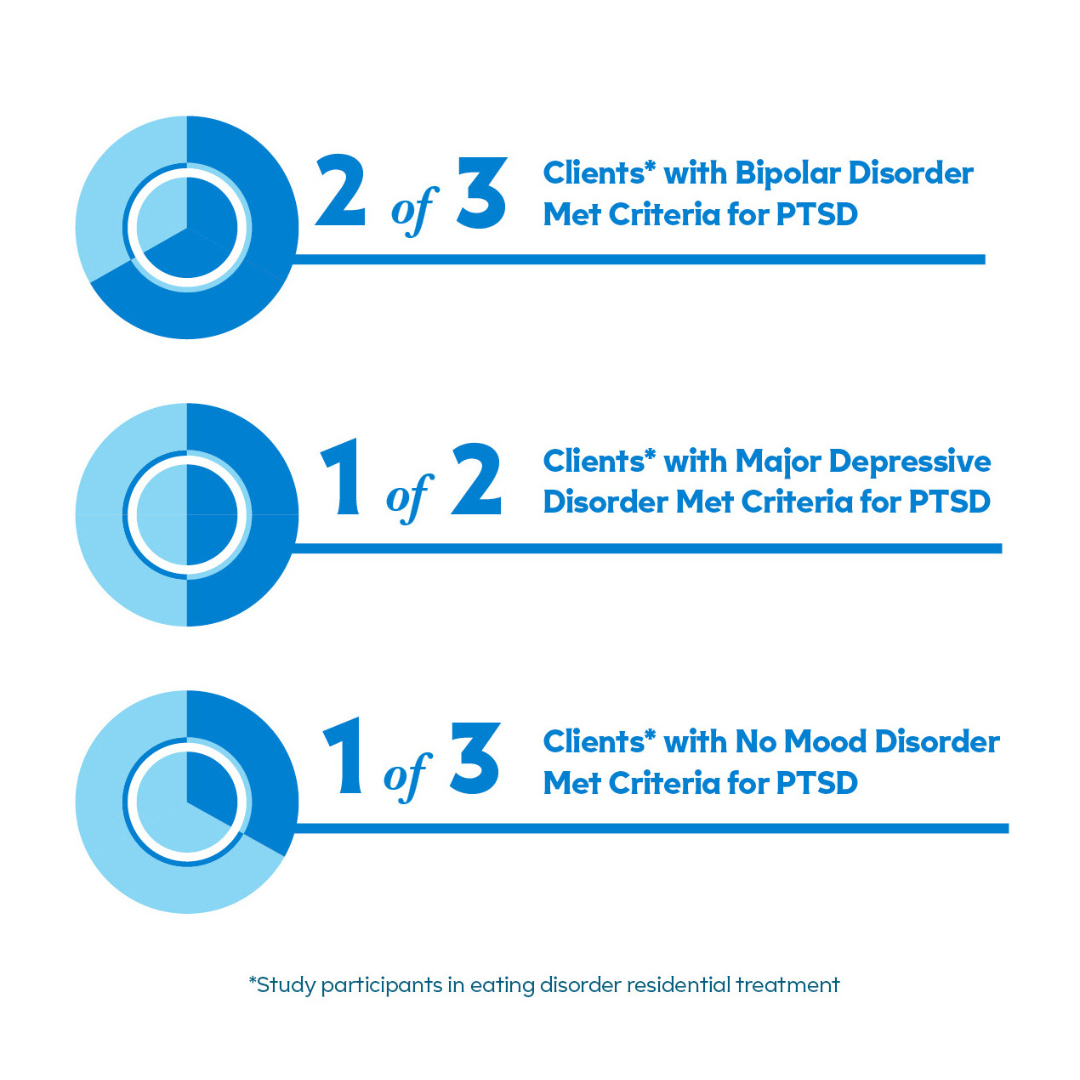Addressing the Connection Between Mood Disorders and Eating Disorders: Insights from Recent Research
Monte Nido’s most recent outcomes show that 85% of all clients had a co-occurring diagnosis of a mood, anxiety or substance use disorder, obsessive-compulsive disorder (OCD) or post-traumatic stress disorder (PTSD). While it’s known that major depressive disorder (MDD) and bipolar disorder (BD) are commonly comorbid with eating disorders, there is limited data about the clinical features of such patients, especially their association with traumatic histories and PTSD, which occur commonly in patients admitted to residential treatment.
Recent research published in the European Eating Disorders Review by Monte Nido found that 76.4% of adults who were admitted to Monte Nido’s resident treatment programs have mood disorders. Having a mood disorder was associated with higher rates of PTSD, more severe PTSD symptom severity, as well as increased severity in depressive and eating disorder symptoms when compared to those who do not have a mood disorder.
Co-occurring PTSD is Common with Mood Disorders
Delving deeper into the data, Monte Nido’s research team observed notable differences between mood disorder diagnoses. Specifically, individuals diagnosed with bipolar disorder exhibited higher rates of traumatic events, current PTSD, and severity across various domains, including eating disorders symptoms, depression, anxiety, and substance use when compared to patients with major depressive disorder (MDD). Similarly, those with MDD demonstrated elevated rates of these clinical features compared to counterparts without mood disorders.
This high prevalence of trauma and its impact in the context of mood disorders underscores the significant intersection between these mental health conditions and emphasizes the need for a nuanced understanding of how they intertwine.

Implications for Treatment and Care
These findings have important implications for prevention, treatment and long-term follow-up of eating disorders, and highlight the need for early trauma-focused treatment of eating disorder clients with comorbid mood disorders and PTSD. The study supports Monte Nido’s previously published research on the benefits of trauma-informed care, which emphasizes the importance of treating PTSD alongside an eating disorder to increase the efficacy of care and long-term recovery rate.
Early intervention and trauma-focused treatment emerge as crucial components in addressing the complex needs of these individuals, particularly within residential treatment settings. By integrating trauma-focused care modalities, such as Cognitive Processing Therapy (CPT), and addressing mood symptoms alongside eating disorders behaviors, clinicians can provide more comprehensive and effective care tailored to the unique challenges faced by these individuals.
The Need for More Research
It’s clear that mood disorders aren’t just a footnote—they’re a significant piece of the eating disorders puzzle. It’s about understanding the whole person and providing care that addresses their unique struggles.
More research is needed, along with greater awareness, to fully grasp the complexities of this intersectionality. Stigma surrounding mental health and barriers to treatment are critical factors that we must work to overcome. By advancing our understanding and delivering tailored, comprehensive care, we can improve outcomes and enhance the quality of life for individuals navigating these intertwined mental health challenges.
If you’re interested in learning more about our programs, please visit www.MonteNido.com or email Admissions@MonteNido.com to connect with a member of our Admissions Team.
Monte Nido is a leading provider of eating disorder treatment, offering inpatient, residential, day, and virtual treatment programs. Delivering clinically comprehensive, research-backed treatment to adults and adolescents of all genders within a healing and affirming environment, we believe recovery is possible for everybody. Founded in 1996, our expert staff of eating disorder professionals deliver compassionate care, breakthrough outcomes, and long-term recovery for our clients. Monte Nido operates 50 programs and in 28 states virtually across their family of programs: Monte Nido, Monte Nido Walden, Monte Nido Rosewood, and Monte Nido Clementine.
